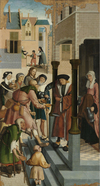Policing Itinerant Poor in the Northern Low Countries, 1450-1570
Making Vagrants
DOI:
https://doi.org/10.51769/bmgn-lchr.11116Keywords:
stadsgeschiedenis, rechtsgeschiedenis, Nederland, Kampen, Deventer, Gouda, Haarlem, armoede, landlopers, vervolging, sociale geschiedenis, politieke geschiedenisAbstract
This article investigates the rise of urban policing of itinerant poor in the Northern Low Countries in the late medieval period. Practices of prosecution show important variations between cities (selected cases are Deventer, Kampen, Haarlem and Gouda), both in chronology and compared to urban bylaws and other regulations, such as the 1531 edict issued by Holy Roman Emperor Charles V. A combination of external factors such as war, conflict, dearth, disease and the socio-political ambitions of urban authorities were at play and could lead to regionally different outcomes. In the course of this process, we see the complex making of vagrancy as a social and legal category to negotiate the reality of a highly mobile society, with a major impact on the attitudes towards itinerant poor and on the latter’s lives.
Dit artikel bestudeert het ontstaan van maatregelen rondom arme migranten in vier steden in de Noordelijke Nederlanden tijdens de Late Middeleeuwen, namelijk Deventer, Kampen, Haarlem en Gouda. Het onderzoek naar hoe deze vervolging van rondtrekkende armen in deze steden in de praktijk werd gebracht, legt belangrijke verschillen bloot wat betreft de chronologie van de maatregelen, alsook in vergelijking met de stedelijke verordeningen en andere voorschriften, zoals het edict van Keizer Karel V uit 1531. Een combinatie van externe factoren, zoals oorlog, conflict, voedselschaarste en ziekte, en interne sociaal-politieke ambities van stedelijke autoriteiten, was bepalend voor deze verschillen. De bestudeerde maatregelen demonstreren de complexe totstandkoming van landloperij als een sociale en juridische categorie, die door lokale autoriteiten werd gebruikt om controle te behouden over een zeer mobiele samenleving. Dit had grote gevolgen voor de houding tegenover rondtrekkende armen en voor het leven van deze landlopers zelf.
Downloads

Published
Issue
Section
License
Copyright (c) 2023 Janna Coomans

This work is licensed under a Creative Commons Attribution 4.0 International License.
Authors who publish with this journal agree to the following terms:
a) Authors retain copyright and grant the journal right of first publication with the work simultaneously licensed under a Creative Commons Attribution 4.0 International (CC BY 4.0) that allows others to share the work with an acknowledgement of the work's authorship and initial publication in this journal.
b) Authors are able to enter into separate, additional contractual arrangements for the non-exclusive distribution of the journal's published version of the work (e.g., post it to an institutional repository or publish it in a book), with an acknowledgement of its initial publication in this journal.
c) Authors are permitted to post their work online (e.g., in institutional repositories or on their website) prior to and during the submission process.
Authors are explicitly encouraged to deposit their published article in their institutional repository.











